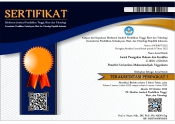The ethics of this publication is a statement of the parties involved in the publishing process, which includes the chairman and editorial members, peer reviewer, and authors. This ethical guide is to allow the publication done ethically and responsibly and according to applicable legal norms.
Publication ethics upholds three ethical values in publication:
- Neutrality, which is free from conflicts of interest;
- Justice, giving authorship rights to those who have the right to be authors; and
- Honesty, meaning free from duplication, fabrication, forgery, and plagiarism.
Therefore, all parties involved in publishing the Jurnal Penegakan Hukum dan Keadilan (JPHK) must direct the ethics of this publication according to the role of each party.
Author
- The author(s) send the original manuscript, no plagiarism.
- The author(s) must maintain the truth, benefits, and information submitted through the manuscript to avoid misleading.
- The author(s) must uphold the rights, opinions, or findings. Therefore, it is necessary to refer to or review them related to the manuscript of the article and must mention the source of information.
- The author(s) must be fully aware not to commit any scientific violations, be it fabrication (making fictitious data), falsification (changing data as desired), or plagiarism (taking words or sentences or other people’s text without providing a citation reference), including self-plagiarism (duplicating one’s work or taking part of a self-published work without citing references).
- The author(s) must convey the information in the manuscript using standard language rules.
- The author(s) must ensure that the name of the person listed as the author in the case of more than one author or others contributing to the writing of the manuscript.
- The author(s) must pay attention to the journal’s policies and ethics of publication and follow the writing guidelines.
- The author(s) must not send the manuscript to other publications, except after being rejected by the Editorial Board.
- The author(s) are collectively responsible for their articles. Therefore, authors must carefully examine submitted manuscripts at each stage and section to ensure methods, analyzes and findings are reported accurately.
- The author(s) correct the article manuscript according to the suggestions from peer reviewer and the editor by giving a sign of improvement (response).
- The author(s) must immediately notify the editor if they find errors in submitted, accepted or published manuscripts.
Editor in Chief
- The editor-in-chief must process the incoming manuscript and notify the correspondent author of the ongoing stages.
- The editor-in-chief assesses the initial feasibility of the manuscript to be continued at the editing stage or not based on journal policies, publication ethics, and writing guidelines.
- The editor-in-chief distributes edits to members of the editorial board, taking into account the scientific field and performance burden.
- The editor-in-chief selects, determines, and appoints members of peer reviewer based on their expertise (does not rule out the possibility based on the editorial board’s advice).
- The editor-in-chief decides the feasibility of publishing the manuscript based on the notes from peer reviewer.
- The editor-in-chief must avoid conflicts of interest in processing article manuscripts due to differences in gender, ethnicity, religion, race, and group identity.
- The editor-in-chief guarantees the confidentiality of the article manuscript at the time of editing except for academic or scientific purposes and does not misuse it for personal interests.
- The editor-in-chief is responsible for the process of publishing manuscripts in Jurnal Penegakan Hukum dan Keadilan (JPHK).
Editorial Board
- The editors correct and evaluate manuscripts suitable for review by peer reviewer based on journal policies, publication ethics, and writing guidelines.
- The editors correct the manuscript by considering the standards and rules of scientific writing.
- The editors ensure that citations and references are written according to style.
- The editors must avoid conflicts of interest in correcting article manuscripts due to differences in gender, ethnicity, religion, race, and group identity.
- The editors guarantee the confidentiality of article manuscripts when editing except for academic or scientific purposes and do not misuse them for personal interests.
Peer Reviewer
- Peer reviewer examines article manuscripts and provides comments on the substance of the article based on journal policies, publication ethics, and writing guidelines.
- Peer reviewer assesses the feasibility of publishing the manuscript of the article being reviewed (accepted, accepted with minor revision, accepted with major revision, or rejected) based on journal policies, publication ethics, and writing guidelines.
- Peer reviewer must avoid conflicts of interest in researching and evaluating article manuscripts due to differences in gender, ethnicity, religion, race, and group identity.
- Peer reviewer guarantees the confidentiality of article manuscripts when reviewed except for academic or scientific interests and does not misuse them for personal interests.

